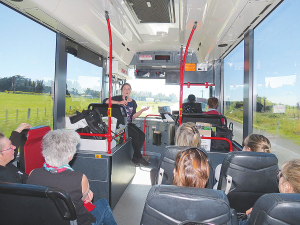Sound familiar?
OPINION: The Hound notes that a new study, carried out by CQUniversity in Queensland, has found similar issues to NZ with a real lack of agricultural knowledge among young Aussies.
 The study identified a lack of agricultural knowledge among school students and suggests exposing students to agricultural workplaces and to people who work in the sector as a way of rectifying this.
The study identified a lack of agricultural knowledge among school students and suggests exposing students to agricultural workplaces and to people who work in the sector as a way of rectifying this.
A new study in Australia has identified a lack of agricultural knowledge among school students, highlighting a need for better agricultural education programs.
In the largest ever study of its kind CQUniversity's Agri-tech Education and Extension research team, led by Dr Amy Cosby, surveyed more than 5,000 primary and secondary students across Australia about their knowledge of agriculture.
The study found many students thought of agriculture as a low-tech industry; four in five primary students and three in five secondary students believe commercial milking of cows occurs by hand rather than machine. Awareness of agricultural careers was also limited with many only able to recognise traditional job roles such as 'farmer' and 'beekeeper'.
Importantly, the study showed one of the key factors impacting students' agricultural knowledge was their level of exposure to farms, with students who live on a farm or who visited a farm at least four times a year scoring significantly higher than those who had never been to a farm.
Cosby said this highlights the importance of including regular exposure to farming activities in agricultural programs for Australian schools.
"If students are not being show an accurate vision of modern agriculture they are unlikely to recognise that agricultural jobs can be highly skilled, well paid and possibly located outside rural areas."
She adds that although agriculture is in a period of rapid technological advancement modern farming practices are not being adequately portrayed to students, calling this a likely contributing factor to the industry's current skilled workforce shortage.
Except for New South Wales' Year 7-8 curriculum, agriculture as a subject is not a mandatory inclusion in most Australian schools.
Most surveyed students could recognise that some fruits and vegetables grow better in certain parts of the world and just over half of secondary students understood that hormones are not given to chickens to make them grow (a practice banned in Australia since the 1960s).
Cosby says the study highlights the need for a formal framework to assess students' agricultural literacy similar to the United States National Agricultural Literacy Outcomes (NALOs), calling the absence of an Australian agriculture literacy framework a "significant deficit" limiting agricultural education.
"Today's students are tomorrow's consumers and their future purchasing decisions will be shaped by their understanding of thngs like animal welfare, environmental sustainability and healthy eating practices," she explains. "Nothing beats exposing students to agricultural workplaces in real life and to peple who work in these careers."
A multi-cultural team is helping to establish one of New Zealand's largest plantings of premium eating grapes - while learning each other's languages and cultures along the way.
The World Wide Sires National All Day Breeds Best Youth Camp Best All Rounder plaudit has become family affair, with 2026 Paramount Cup winner Holly Williams following in her sister Zara's footsteps.
DairyNZ is giving New Zealand farmers a unique opportunity to gain hands-on governance and leadership experience within the dairy sector.
Herd improvement company LIC has posted a 5.2% lift in half-year revenue, thanks to increasing demand for genetics.
According to the latest Fresh Produce Trend Report from United Fresh, 2026 will be a year where fruit and vegetables are shaped by cost pressures, rapid digital adoption, and a renewed focus on wellbeing at home.
The Roar is a highlight of the game hunting calendar in New Zealand, with thousands of hunters set to head for the hills to hunt male stags during March and April.